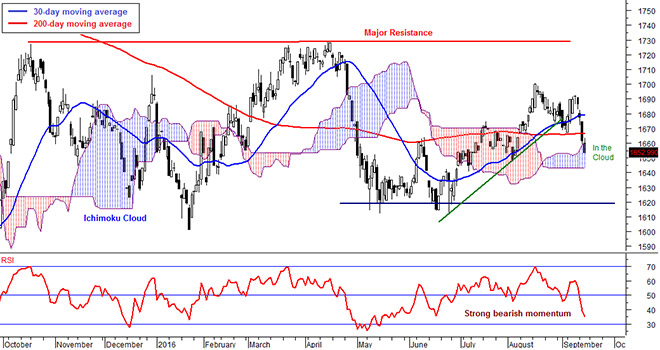
Daily FBM KLCI chart as at Sept 15, 2016 using Next VIEW Advisor Professional
The market was bearish in the past one short week. With only three trading days, the market fell each day on bearish markets performances globally and weak ringgit.
The market was also cautious ahead of the long weekend and trading volume declined.
The benchmark FBM KLCI fell 2.0 per cent in a week to 1,652.99 points last Thursday (Market was closed on Friday for holiday).
The average daily trading volume last week was only 1.5 billion shares as compared to 1.6 billion shares two weeks ago. However, the average trading value increased from RM1.8 billion to RM2.0 billion, a sign of lower retail market participation.
After weeks of being net buyers for Bursa Malaysia, foreign institutions turned net seller last week.
Net sell from foreign institutions last week (Tuesday to Thursday) was RM566 million and net buys from local institutions and retail were RM485 million and RM81 million respectively. The ringgit weakened from RM4.10 last week to RM4.14 against the US dollar.
Decliners beat gainers five to one in the FBM KLCI. The top gainers for the week were Hong Leong Financial Group Bhd (1.8 per cent in a week to RM15.98), Astro Malaysia Holdings Bhd (0.7 per cent to RM2.92) and YTL Corporation Bhd (0.6 per cent to RM1.74).
The top decliners were Axiata Group Bhd (5.8 per cent to RM5.32), CIMB Group Bhd (5.3 per cent to RM4.64) and Sapurakencana Petroleum Bhd (4.9 per cent to RM1.54).
Asian markets performances were bearish. China’s Shanghai Stock Exchange Composite declined 2.5 per cent in a week to 3,002.67 points last Wednesday (Market was closed on Thursday and Friday for holidays).
Japan’s Nikkei 225 index fell 2.6 per cent in a week to 16,519.29 points and Singapore’s Straits Times fell 1.6 per cent to 2,827.45 points on Friday. Hong Kong’s Hang Seng Index declined 3.2 per cent in a week to 23,335.59 points on Thursday.
US market ended firm in a week while markets in Europe fell. The US Dow Jones Industrial Average increased 0.2 per cent in a week to 18,123.80 points last Friday. London’s FTSE100 declined 1.0 per cent in a week to 6,710.28 points and Germany’s DAX Index fell 2.8 per cent to 10,276.17 points.
US strengthened against major currencies. The US dollar index futures increased from 95.3 points to 96.1 points last Friday. Commodities prices fell. COMEX Gold fell 1.4 per cent to US$1,313.2 ounce.
Crude oil (Brent) declined 3.8 per cent in a week to US$ 46.05 per barrel. Crude palm oil in Bursa Malaysia fell 1.7 per cent in a week to RM2,594 per metric tonne.
The FBM KLCI broke below the short and long term 30 and 200-day moving averages after failing to rebound from the immediate support level at 1,665 points. This indicates that the trend has turned bearish.
The index has also dived into the Ichimoku Cloud indicator and this shows that the market is heading into uncertainty.
Falling momentum indicators indicate that the bearish momentum is strengthening. The RSI and Momentum Oscillator indicators felt to multi-months low and the MACD indicator’s gap with its moving average is widening.
Furthermore, the index is trading at the bottom bands of an expanding Bollinger Bands indicator, an indication of a strong bearish momentum.
With weak market sentiment and technical readings on the chart, the market is expected to continue to stay bearish as support levels were broken.
However, we may expect some rebound as the market turned a little oversold and there may be some bargain hunting.
If the FBM KLCI rebounds and fails to climb above the previous support turned resistance level at 1,665 points, then expect the bearish trend to continue and the index to test the next support level at 1,620 points.
The above commentary is solely used for educational purposes and is the contributor’s point of view using technical analysis. The commentary should not be construed as an investment advice or any form of recommendation. Should you need investment advice, please consult a licensed investment advisor.
